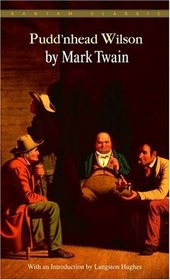Hilarious short novel by Mark Twain - can be read as a funny story or interpreted with deep symbolism.
As a single mother who strives to make sure her children have the best the world has to offer, this quick and exciting read gives insight to what, if any, harm uncontrollable doting on your children could cause. At first glance, Puddenhead Wilson by Mark Twain, is about a slave mother named Roxy, who wants the best for her child and devises to switch her unfortunate child with the heir of a plantation at the unsuspecting age of eight months old. It turns out that the son to whom she gave life becomes the oppressor and the âmarster's sonâ became her SON. She gave him everything from the opportunity to a better life to, later, the sacrifice of her own free life. It would seem that this is the basis of the story but there are many underlying themes to explore.
This book, also, hinges on the theme that you are product of your environment not birth right. The âpoorâ or less fortunate child became rich and pompous while the heir learned to live the pauper life. Hence, when all was said and done, the pauper was not comfortable in his new setting as the reinstated heir. He had come to learn and live the pauper life with a slave mentality, mannerisms and dialect. This is a classic reversal of our social hierarchy placed a humorous and witty style.
One of the other components of the book was the quick calendar entries at the beginning of each chapter. It showcases Twain's ability to bring pause and thought â" perhaps even a change in that thought. The use of them by Judge Driscoll to impress his friends and colleagues cues the reader in that they are not to be ignored or overlooked but pondered.
This is one of Mark Twain's best pieces. It is a quick look into how he really felt about our land of the rich and famous. Amazingly it still holds true today.
This book, also, hinges on the theme that you are product of your environment not birth right. The âpoorâ or less fortunate child became rich and pompous while the heir learned to live the pauper life. Hence, when all was said and done, the pauper was not comfortable in his new setting as the reinstated heir. He had come to learn and live the pauper life with a slave mentality, mannerisms and dialect. This is a classic reversal of our social hierarchy placed a humorous and witty style.
One of the other components of the book was the quick calendar entries at the beginning of each chapter. It showcases Twain's ability to bring pause and thought â" perhaps even a change in that thought. The use of them by Judge Driscoll to impress his friends and colleagues cues the reader in that they are not to be ignored or overlooked but pondered.
This is one of Mark Twain's best pieces. It is a quick look into how he really felt about our land of the rich and famous. Amazingly it still holds true today.
Funny book about race relations in the Civil War era.
At the beginning of Pudd'nhead Wilson a young slave woman, fearing for her infant's son's life, exchanges her light-skinned child with her master's. From this rather simple premise Mark Twain fashioned one of his most entertaining, funny, yet biting novels. On its surface, Pudd'nhead Wilson possesses all the elements of an engrossing nineteenth-century mystery: reversed identities, a horrible crime, an eccentric detective, a suspenseful courtroom drama, and a surprising, unusual solution. Yet it is not a mystery novel. Seething with the undercurrents of antebellum southern culture, the book is a savage indictment in which the real criminal is society, and racial prejudice and slavery are the crimes. Written in 1894, Pudd'nhead Wilson glistens with characteristic Twain humor, with suspense, and with pointed irony: a gem among the author's later works.
(amazon.com)
(amazon.com)
This is a comic strip version of the story.
this brilliant small masterpiece combines an almost forgotten facet of American life, a detective story, a scathingly clear look at human nature, and Mark Twain's wildly riant humor to make a novel as startlingly true for the present as for the past of which it tells. Introductino by Langston Hughes.
Mark Twain at his satirical best.




